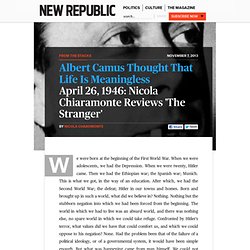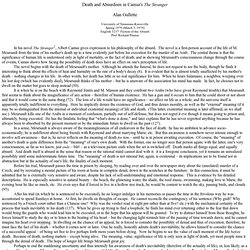

'The Stranger' on Bush's Summer Reading List. Albert Camus' The Stranger. We were born at the beginning of the First World War.

When we were adolescents, we had the Depression. When we were twenty, Hitler came. Then we had the Ethiopian war; the Spanish war; Munich. This is what we got, in the way of an education. After which, we had the Second World War; the defeat; Hitler in our towns and homes. In a bald and clumsy summary, this is what Albert Camus had to say when he was asked to lecture in New York on the subject of "The Crisis of Man.
" The world of action, to them, has not meant an escape from the world of thought, as it has to some of their elder brothers. There are several eminent writers in France today, but none who has taken up with more decision and clarity than Albert Camus the intellectual and moral implications, as well as the human pathos, of such a situation. It is a situation that consists essentially of intellectual, moral, and practical antinomies. The story is simple. It is the hero himself who tells the story. Who is Meursault? Camus's Restless Ghost - The Chronicle Review.
By Robert Zaretsky Henri Cartier-Bresson, Magnum Photosn Albert Camus "Even my death will be contested.

And yet what I desire most today is a quiet death, which would bring peace to those whom I love. " Albert Camus's prediction has been borne out—but not his hope. Camus was remarkable witness to his times. Over the past couple of years, official efforts to commemorate Camus have faltered. More recently, ideological and political collisions have capsized plans for a grand centennial exhibition in Aix-en-Provence, home of the Camus archives. Few writers were more conflicted over personal and national identity than Camus. Algeria was nevertheless considered part of France, even with several million Arabs and Berbers who were denied the rights of citizenship. Camus's efforts failed, and he fell silent—a public silence that began in 1956 and remained almost unbroken until his death, four years later. Camus, The Stranger. Death and Absurdism in Camus's The Stranger by Alan Gullette.
Death and Absurdism in Camus's The Stranger Alan Gullette University of Tennessee-Knoxville Spring 1979 (March 5, 1979) English 3237: Fiction of the Absurd Prof.

In his novel The Stranger1, Albert Camus gives expression to his philosophy of the absurd. The novel begins with the death of Meursault's mother. It is when he is on the beach with Raymond Sintès and M. In a sense, Meursault is always aware of the meaninglessness of all endeavors in the face of death: he has no ambition to advance socio-economically; he is indifferent about being friends with Raymond and about marrying Marie; etc. Before his trial, Meursault passes the time in prison by sleeping, by reading over and over the newspaper story about the (unrelated) murder of a Czech, and by recreating a mental picture of his room at home in complete detail, down to the scratches in the furniture.
The idea of death makes one aware of one's life, one's vital being – that which is impermanent and will one day end. Professor's Comment: Camus's "The Stranger": First-Line Translation. For the modern American reader, few lines in French literature are as famous as the opening of Albert Camus’s “L’Étranger”: “Aujourd’hui, maman est morte.”

Nitty-gritty tense issues aside, the first sentence of “The Stranger” is so elementary that even a schoolboy with a base knowledge of French could adequately translate it. So why do the pros keep getting it wrong? Within the novel’s first sentence, two subtle and seemingly minor translation decisions have the power to change the way we read everything that follows. What makes these particular choices prickly is that they poke at a long-standing debate among the literary community: whether it is necessary for a translator to have some sort of special affinity with a work’s author in order to produce the best possible text. Arthur Goldhammer, translator of a volume of Camus’s Combat editorials, calls it “nonsense” to believe that “good translation requires some sort of mystical sympathy between author and translator.”